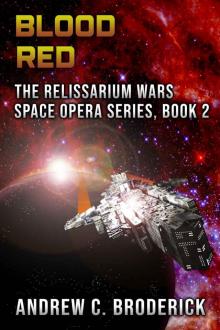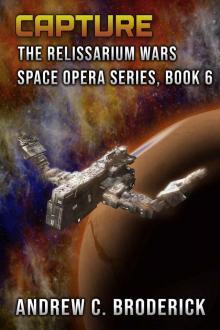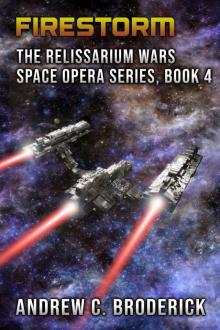- Home
- Andrew C Broderick
The Lost Colony Series: Omnibus Edition: All Four Volumes in One Page 4
The Lost Colony Series: Omnibus Edition: All Four Volumes in One Read online
Page 4
“Three, two, one, engine start,” came the voice from the cockpit.
Immediately, Morgan felt like there was another person sitting on her chest. She expanded her lungs by breathing in slowly, as she had been trained to do. The others did likewise. There was a dull roar. The cabin vibrated slightly as the ZPR engines below them poured forth thousands of tons of thrust. Glare shields had come down to protect the downward facing cameras from being burned out by the sun-like intensity of the exhaust. As a result, there was now a large blind spot when one looked down, since no exterior view could be provided in that direction.
“Twenty-four minutes to landing,” came the Captain’s voice. Sally turned her head to face Morgan. She gave a thumbs up, and Morgan returned the gesture.
Sally looked out past Morgan and the others in their row to the horizon. She had to crane her neck around as far as it would go to see Epsilon’s surface, still far below. She watched as it slowly came up to where she could see it easily. Hercules was still dropping through thousands of kilometers of space, like an express elevator of the gods.
The blue ball that was the planet was now easily visible from the horizontal, the hazy horizon stretching in a vast curve. As time passed, the line straightened. Clouds that had previously been like brush strokes on the surface of a blue matte were now visible as stacks of billowing white, projecting high above the ocean. Sally turned to her left and, just as she had previously only seen an ocean, now she saw only land. It was a beautiful day. Rocky plains stretched for hundreds of kilometers, before rising into small mountains. These increased in size, culminating in a range of vast snow-capped peaks in the distance. “Wow,” she said quietly.
Darius was also looking left. “Well, will you look at that,” he said in an awed tone. Fingers of pure rock, kilometers high and hundreds of kilometers long, cut across the otherwise green and brown landscape towards them. “That’s gonna look amazing from the ground.”
“Yeah, it is. I’m on the first rover ride out there, I can tell you that.” Sally looked up. “Look at that, too. Blue sky! We’re not in space anymore.”
“Yep,” Morgan said. Her selfie recorder was now useless, as it was facing the floor.
“There are lakes here and there, too. Look out that way”—Sally pointed—”in the middle distance. Volcanic activity? Glacial? Who knows?”
“That’s what we’re here to find out,” Chris said. “The best guess so far is that this whole place was covered by a massive ice sheet at one point. Doesn’t explain those long rock formations though. They don’t have peaks like mountains; they just look like ocean waves frozen in time. We don’t really have anything like them on Earth. You’d think they’d have been ground flat if there were glaciers here.”
“Unless they were channels for the ice, as it spread out over the plains towards the sea,” Darius said. “Although whatever ice age there was, was a long time ago. The surface features look like they’ve had plenty of weathering. At least from the 3D models. An up-close look will tell for sure.”
“We’ll have to make the most of the summer months,” Morgan said. “The winter’s going be long, dismal, and brutally cold. By the way, how do they know it’s twelve degrees down there?”
“Weather station,” Darius said.
“Duh. Of course.”
“Wish we could see Serenity Bay.”
“Yeah.”
Smaller rocky outcrops and patches of brown vegetation were now clearly visible, as Hercules continued descending on her column of fire.
“I just can’t wait to get in that ocean,” Morgan said, eyeing the deep blue expanse. “It looks so inviting, like the Mediterranean. I just want to jump in!”
“Never mind that it’s a sea on an alien world, and could have anything in it. Including giant sea monsters,” Sally said.
“Yeah, but apart from that…”
* * * *
Had the astronauts been able to look straight down, they would have seen the low plain of dark rock on which stood the town of Serenity Bay with its rows of houses and all its infrastructure, including three gigantic landing pads some distance inland from the settlement. They were made of concrete, and marked with a giant 1, 2, and 3 respectively. The pads were spaced some distance apart and there was a paved road from each, stretching one kilometer to the town. They converged on the end of Main Street, near a cluster of two-story buildings. The road headed north through the town and down a natural incline towards the sea, with houses on either side. Main Street met the coast at the shoreline of a natural harbor. Yet more streets lay either side of that main thoroughfare, each with more houses along its run. Off to the west of Serenity Bay was a giant yard where the automatic bulldozers, backhoes, cement mixers and steamrollers stood, idle now after finishing the construction. Other, more refined, robots were nearby—they had put in windows, pipes, electrical wiring, data cables, and servers.
“One minute and thirty seconds to landing,” Jake DiMaso said.
“Aww yeeeeaaah!” Chris yelled.
Hercules was in the last two kilometers of her descent, now hurtling through the thickest part of Epsilon’s atmosphere. Her engines bathed the area surrounding Serenity Bay in light brighter than the midday sun, while a wall of pure sound roared forth, shaking the buildings and rolling across the plains. It was probably the loudest noise heard there in thousands of years.
Pad number 1 began to be buffeted, then blasted and scorched, as the white hot shock diamonds of the ship’s exhaust pounded it with god-like fury. The ten meter-high curved blast containment wall to the east of the pad strained and shook as it did its job of stopping the massive pressure waves from reaching the town and breaking the windows and cracking the buildings. Hercules hovered for a few seconds as the hellfire from her engines continued to beat down. Landing legs extended all around the base of the hull. Then, she slowly settled down onto them. Her engines shut off, leaving the immense roar echoing out across the plains and mountains.
“Whoohoo!” “Yay!” “Alright!” “Hot damn!” came the shouts and hollers that filled the passenger compartment, as their seats tilted forward to a more natural sitting position again. There was clicking all around as everyone unbuckled. The clamor of excited voices continued unabated as they rose and stretched, sounding like a bus load of school children who had just arrived at an amusement park.
“You can all move around, but we can’t get out for at least forty minutes,” Jake said over the intercom. “The ground’s got to cool down first.”
“Thought as much,” Chris grumbled.
“Yeah. But… we’re here! We’re actually on Epsilon!” Sally whooped.
* * * *
“Come on, guys,” a couple of voices pleaded as Chris, Sally, Morgan, and Darius made their way down the stairs into the lower passenger compartment “There’s only supposed to be room for fifty in here!”
“Well, we’re going down as soon as the hatch is open,” Chris said. “So if you lower compartment inhabitants would kindly make way…”
“You know, this is actually a very big deal,” Darius said. “Whoever gets down first has bragging rights for all time of being the first human to set foot on an exoplanet.”
“All right, stand aside!” came Captain Martelle’s authority-laden voice as he descended the stairway into the small, crowded area. “I’m gonna be the first down, and that’s all there is to it.
“Yes Sir,” the others said, crushed.
“Darius shrugged. “Only makes sense, I guess. He’s the captain, after all.”
“True that,” Morgan said. “But, what I wouldn’t have given…Now that would be a great opener for the book…”
“Sally rolled her eyes. “Here we go…” Morgan shot her a sideways glare but kept quiet. They all stood around watching the hatch, which was in the floor at the center of the back of the compartment. People were lined up the stairs, as there was no more room.
“Five more minutes,” came the copilot’s voice from the cockpit. �
��The ground’s still like 60°C.”
“Can’t we just open the valve and dump water from the tanks on it?” Chris said, half jokingly.
“Negative,” Martelle said. “We’ve got to conserve what’s in there, and replenish it once we get the purification plant going in case we need to take off again in a hurry.”
There was a hiss, and the hatch slowly opened downwards. A metal staircase rose up to the front edge of what was now a hole in the floor. There were excited, expectant murmurs all around. All eyes were on the Captain. “What are you gonna say, Captain?” Chris asked. “Is it gonna be like one small step for a man or something?”
The captain turned to face Chris, as a cool breeze blew in from below. “You know I haven’t even really thought about it.”
“How about you jump from the third step up, and say this is one giant leap for a captain, and one small step for everybody else?” There were chuckles all around.
“Well I’m not going to keep y’all waiting any longer,” Captain Martelle said, turning back to the staircase below. He proceeded down the steps, traversing the six meters from Hercules’ belly to the perfectly flat concrete. He stepped off casually, just like he had gone down the stairs at home, and looked back up at the ring of expectant faces. He paused and said, “Baked beans.”
“So that’s it? Those are the first human words uttered on a new world?” Darius said, looking utterly perplexed.
Martelle was grinning. “Yes. Yes they are. And they can’t be unsaid. Now, without further ado, the rest of you get down here and join me. It still pretty hot, but nothing we can’t deal with.” Without being asked twice, the rest of the crew filed quickly down the metal stairs onto the ground.
“It’s hot enough to fry an egg on this pad,” Chris said, as the landscape around the pad danced in the heat haze.
Soon, all 100 crew members were standing around beneath the huge ship, looking around and conversing in excited tones.
“Let’s get off the pad,” Morgan said. “Like the inside of an oven out here.” She, Sally, Chris, and Darius walked to where the concrete gave way to rocks that had probably been there for millions of years.
Back in the shadow of the ship, Faith looked at the device attached to her wrist. “Captain, that thing’s moved.”
“What?”
“The UFO. It’s changed its orbit: it’s descending.”
CHAPTER TEN
Present Time
John looked up at the outside of the spaceship Atlas. She was a large ship at the best of times, but inside the IDSA’s vehicle assembly building, she seemed truly vast. He looked at the nose section, containing the seating for the 100-strong crew. It was white, square in section, and tapered to a blunt point—a horizontal obelisk cut off near its base. The nose section could also detach and fly on its own if the crew needed to escape some disaster on the rest of the ship. Behind that was a much bulkier section, slightly higher than the nose, and three times as wide. It extended back roughly eighty meters, rectangular in section, with the corners cut off at forty-five degrees. At regular intervals, contrasting against Atlas’ white hull, were three meter-wide square plates. These were John’s babies: the gravitometer array. Together, they fed a 3D picture of the precise gravitational environment around the ship to its navigation computers. In warp flight, these were the backbone of her positioning system. The data they provided would guide her across an unimaginably empty gulf, and in to a precise arrival near Epsilon. As a second navigation engineer, it was John’s job to calibrate the gravitometers before flight, and then monitor them very closely during all phases of the mission. To be more precise, it would have been his job had he been selected to crew the mission. John had eventually made the journey from disbelief to acceptance that he would remain on the ground. He had gladly assisted Ben Sanchez and Nikolai Cronin in helping get this crucial part of the ship’s systems up and running, though full calibration of the array could only take place well away from any large gravity well, as the system was so sensitive. This meant that Atlas had to fly well into deep space under ZPR power, as far from the Sun and planets as could reasonably be achieved, before this could be accomplished and she could enter warp flight.
Walking further along towards the tail of the ship, John inspected the large bulge that extended all the way from her midsection to the aft section, containing all the wonderful warp machinery. He broke out in goose bumps as he thought about the power and capability of Atlas. Oh, how earlier generations dreamed of spaceflight like this! And what would the next generation of ships bring? More light years of travel, or maybe something different entirely—instant point-to-point transport perhaps. Maybe his grandchildren would see the Milky Way from the outside, or go yet further. A society as envisaged by Isaac Asimov would then be possible, intergalactic in nature. Would there be a Hari Seldon, the hero of his seminal Foundation series that John had devoured as a boy? Who knew?
But, there she was. His baby, the work of generations. In two days, she would depart for space, for a week of highly accelerated testing and gravitometer set up before departing for Epsilon. Only then would anybody know what had happened to the crew of the Hercules. Though hopefully there would be an answer before she left, with the return of the courier probe Andromeda. That would come tomorrow, a mere one day before Atlas’ departure. Depending on what she reported, they could potentially better prepare for the trip. Or, in the best case scenario, she would report that the colony was intact, and everyone was okay. In that case, Atlas’ departure could be pushed back, and she could undergo the highly desirable extended (normal) period of preparation and required testing. But, there she was, the work of generations. A giant self-contained chunk of the best technology mankind was able to deliver, going on a dream flight. John wanted to go so bad he could taste it. But, it wasn’t going to happen. So, what then? He would very likely stick with the IDSA, as they would undoubtedly build many more unmanned interstellar probes, all of which would need his rare skills.
* * * *
John hadn’t seen Nandi in over a week. He guessed she was in over her head with work and mission prep. She was still as good a friend as ever, now that she had come to terms with John’s enormous deceit in even getting into the astronaut corps. He hoped to see her one more time, before the vast doors of the vehicle assembly building opened, Atlas rolled the eight kilometers to her enormous launch pad, and the area around Kiruna, Sweden was bathed in enough light and roiling, booming sound waves to fool the unwary into thinking a nuclear war had started.
“Call from Bob McFadden,” John heard in his head, as he gazed up at Atlas.
“Hi, Bob. What can I do for you this fine day?”
“Come on up and see me. You know where my office here is, right?”
“Umm…”
“434A.”
“Okay, coming over now.”
It was nearly lunch time. John had been about to head off to the cafeteria, with its pleasing view out over the snowy wastes around Kiruna. What could Bob possibly want? Calls from the boss, which Bob technically still was until Atlas departed, were never good if the subject wasn’t announced beforehand. John walked the 100 meters back to the door at the bottom of the vast vehicle hangar, which looked from a distance to be as small as a mouse hole in a large ballroom. He headed along a sterile white corridor, to a bank of elevators, and then up to the fourth floor. A right turn and another 100 meters along another white corridor brought him to the cheap faux wooden door of Bob’s office.
Bob wore his signature frown and department store shirt, the top two buttons undone. “Come on in and have a seat.”
John did as he was told. Was he about to be exposed? Had someone figured out who he really was? Had Nandi turned him in? Surely not her… What if the assassination of the Whitewoods had been traced back to him after all these years? All these thoughts flashed through John’s mind within seconds. Whatever would be would be.
“Let me cut straight to the point John. Ben Sanchez is sick. He came
down with the flu and had to be quarantined. He can’t fly. You’ll take his place. Congratulations, you’re flying on CM-2.”
John blinked several times, unsure that he’d heard Bob correctly. “I’m… what?”
“You’re flying on the Atlas, John. Your contributions during the flight prep time haven’t gone unnoticed. Get your things packed: you leave in two days.”
There were another few seconds of stunned silence. Then, a lone tear ran down John’s left cheek. “I… don’t know what to say!”
Bob came the closest to smiling that John had ever seen. “No time to waste, young man. Get your stuff, make your arrangements, and then go see Captain Weber and Mike Van Buren for a briefing.”
“I will. Thank you, Bob. Thank you so much!”
“You’re welcome. Now go on, get out of here, we’re both busy men. I’ll see you again in a few months.” John didn’t need to be told twice.
CHAPTER ELEVEN
Nandi hugged John long and hard before the start of the all-crew briefing, one day prior to departure. Despite the shower of congratulations John had received on becoming part of the very small, elite group of people who would fly Atlas into deepest space, this raised a few eyebrows. Michael Van Buren in particular, with his mop of ginger hair, registered surprise and then annoyance as the pair embraced at the back of the meeting room.

 The Relissarium Wars Omnibus
The Relissarium Wars Omnibus Blood Red: The Relissarium Wars Space Opera Series, Book 2
Blood Red: The Relissarium Wars Space Opera Series, Book 2 The Cosmic Bullet: The Enigma Series, Part One
The Cosmic Bullet: The Enigma Series, Part One Zara's Flight: Book One of the Kato's War series
Zara's Flight: Book One of the Kato's War series Annihilation: The Relissarium Wars Space Opera Series, Book 1
Annihilation: The Relissarium Wars Space Opera Series, Book 1 Blood Red
Blood Red The Lost Colony Series: Omnibus Edition: All Four Volumes in One
The Lost Colony Series: Omnibus Edition: All Four Volumes in One Kato's War: Book Two of the Kato's War series
Kato's War: Book Two of the Kato's War series Capture: The Relissarium Wars Space Opera Series, Book 6
Capture: The Relissarium Wars Space Opera Series, Book 6 Destination: Earth: The Enigma Series, Part Three
Destination: Earth: The Enigma Series, Part Three Kato's War
Kato's War Broken Angel
Broken Angel Firestorm: The Relissarium Wars Space Opera Series, Book 4
Firestorm: The Relissarium Wars Space Opera Series, Book 4 Missing: The Lost Colony Series, Part One
Missing: The Lost Colony Series, Part One